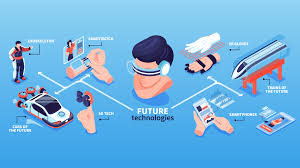
Unleashing the Power of Technological Innovation: Shaping Tomorrow’s World
The Evolution of Technological Innovation
Technological innovation has been the driving force behind the progress of human civilization for centuries. From the invention of the wheel to the development of artificial intelligence, each breakthrough has shaped our lives and reshaped industries in profound ways.
One of the key characteristics of technological innovation is its ability to disrupt existing norms and create new possibilities. Innovations such as the steam engine, electricity, and the internet have revolutionised how we live, work, and communicate. These advancements have not only increased efficiency and productivity but have also opened up new avenues for creativity and collaboration.
In today’s fast-paced digital age, technological innovation is accelerating at an unprecedented rate. Breakthroughs in areas such as robotics, biotechnology, and renewable energy are transforming industries and creating opportunities for sustainable growth. The rise of smart devices, cloud computing, and big data analytics are reshaping how businesses operate and interact with customers.
Moreover, technological innovation is not limited to physical products or services but also extends to processes and systems. Concepts like blockchain technology, machine learning, and virtual reality are revolutionising how we secure transactions, make decisions, and experience the world around us.
As we look towards the future, it is clear that technological innovation will continue to play a crucial role in shaping our society. With advancements in fields like quantum computing, nanotechnology, and space exploration on the horizon, we can expect even greater leaps in human progress.
However, with great power comes great responsibility. It is essential that we harness technological innovation for the collective good of humanity while being mindful of its potential risks and implications. By fostering a culture of ethical innovation and collaboration, we can ensure that technology continues to serve as a force for positive change in our world.
In conclusion, technological innovation is a dynamic force that propels us towards a brighter future filled with endless possibilities. Embracing this spirit of innovation allows us to adapt to challenges, seize opportunities, and shape a world that is more connected, sustainable, and inclusive for all.
Understanding Technological Innovation: Its Importance, Impact, and How to Foster It
- What is technological innovation and why is it important?
- How does technological innovation impact businesses and industries?
- What are some recent examples of technological innovation?
- What role does government play in fostering technological innovation?
- How can individuals contribute to technological innovation?
What is technological innovation and why is it important?
Technological innovation refers to the process of introducing new ideas, methods, or products that bring about significant advancements in technology. It is crucial for driving progress and shaping the future of society by improving efficiency, creating new opportunities, and solving complex challenges. Technological innovation plays a key role in enhancing productivity across various industries, fostering economic growth, and improving quality of life for individuals worldwide. By continuously pushing boundaries and exploring new possibilities, technological innovation drives creativity, competitiveness, and sustainable development in a rapidly changing world.
How does technological innovation impact businesses and industries?
Technological innovation has a profound impact on businesses and industries, reshaping the way they operate, compete, and evolve. By introducing new tools, processes, and products, innovation can enhance efficiency, productivity, and competitiveness within organisations. It enables businesses to streamline operations, reach new markets, and deliver enhanced customer experiences. Industries that embrace technological innovation often experience significant growth opportunities and stay ahead of the curve in a rapidly changing market landscape. However, technological innovation also presents challenges such as the need for continuous adaptation, investment in training and development, and addressing potential disruptions to traditional business models. Overall, the impact of technological innovation on businesses and industries is transformative, driving progress and shaping the future of commerce.
What are some recent examples of technological innovation?
Recent years have witnessed a plethora of remarkable technological innovations that have reshaped the way we live and work. From the widespread adoption of artificial intelligence and machine learning in various industries to the development of autonomous vehicles and drones, the pace of innovation shows no signs of slowing down. Other notable examples include advancements in renewable energy technologies, such as solar panels and wind turbines, as well as the rise of smart home devices and Internet of Things (IoT) solutions that are transforming how we interact with our living spaces. These recent examples of technological innovation highlight the endless possibilities that technology offers in enhancing efficiency, sustainability, and connectivity in our rapidly evolving world.
What role does government play in fostering technological innovation?
The role of government in fostering technological innovation is paramount, as it serves as a catalyst for driving progress and economic growth. Governments play a crucial role in creating an environment that encourages research and development, provides funding for innovative projects, and establishes regulatory frameworks that support the adoption of new technologies. By investing in education and infrastructure, promoting collaboration between industry and academia, and offering incentives for innovation, governments can stimulate creativity and entrepreneurship within their countries. Additionally, through policies that protect intellectual property rights and promote fair competition, governments can ensure a level playing field for businesses to thrive and contribute to the advancement of technology on a national and global scale.
How can individuals contribute to technological innovation?
Individuals play a crucial role in driving technological innovation forward through their creativity, curiosity, and willingness to explore new ideas. By staying informed about the latest trends and developments in technology, individuals can contribute by sharing their insights, collaborating with like-minded innovators, and actively participating in forums and discussions. Additionally, individuals can contribute to technological innovation by experimenting with new technologies, proposing novel solutions to existing problems, and supporting initiatives that promote diversity and inclusion in the tech industry. Ultimately, by embracing a mindset of continuous learning and open-mindedness, individuals can make meaningful contributions to the ever-evolving landscape of technological innovation.